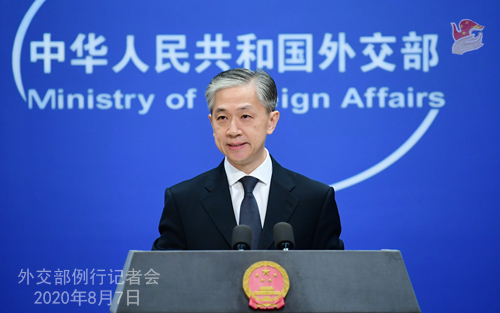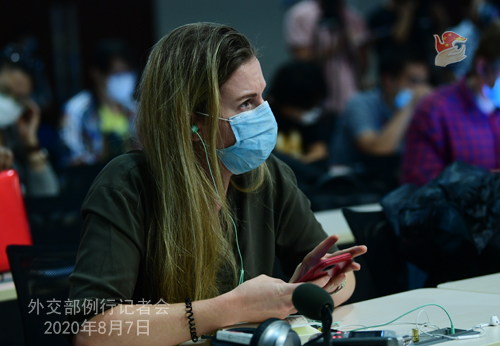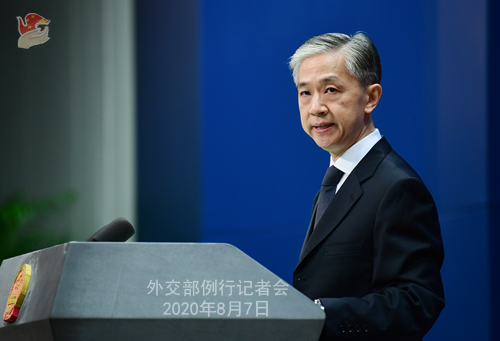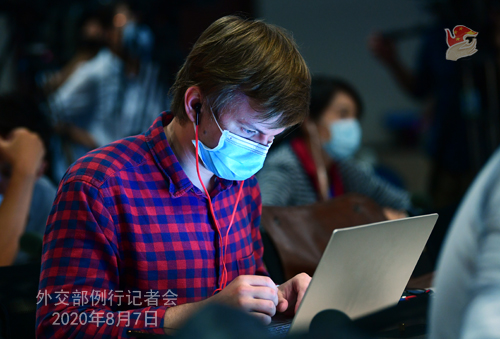| Foreign Ministry Spokesperson Wang Wenbin's Regular Press Conference on August 7, 2020 |
| 2020-08-07 22:11 |
|
AFP: According to the New York Times, the US is scrutinizing whether Saudi Arabia is using the Chinese expertise to move toward the development of a nuclear weapon, so can you give us more details on this nuclear cooperation with Saudi Arabia and what's your reaction to this US inquiry? Wang Wenbin: The US allegation is groundless. China and Saudi Arabia are comprehensive strategic partners. Our bilateral relations have grown steadily and soundly, with fruitful cooperation in various fields. China and Saudi Arabia maintain normal energy cooperation. China has been working to promote the peaceful uses of nuclear energy in the world with a responsible attitude. We will continue our strict fulfillment of international obligations in non-proliferation, and pursue cooperation in peaceful uses of nuclear energy with other countries on the basis of mutual respect and shared benefit, so as to contribute to global sustainable development. The Paper: US Ambassador to China Terry Branstad visited Shanghai yesterday. Branstad said that in the face of the COVID-19 pandemic, the medical supplies from China to the US have saved lives. He expects to promote bilateral exchanges and cooperation, and overcome the influence brought by the COVID-19. What is your comment? Wang Wenbin: The pandemic respects no borders and races. To defeat this mankind's common enemy, solidarity and cooperation is our most powerful weapon, and saving lives is the most urgent task. We know what the US has been going through at this critical moment and have provided large amounts of medical supplies to the US. We also made it easier for the US to purchase medical goods from China. Statistics show that by August 2, China has provided 26.5 billion masks, 330 million protective gowns, 31 million pairs of protective goggles, 610 million pairs of surgical gloves and 11,500 ventilators to the US side. We hope that the US will prevail over the pandemic at an early date. We also hope that a few US politicians can stop politicizing the epidemic, stigmatizing the virus, and shifting blames to China. They need to work with the international community to overcome the influence of the pandemic. AFP: US President Donald Trump signed executive order on August 6 to restrict transactions with Chinese-owned social media like the owners of TikTok and WeChat in the US. So what's China's reaction to that? Wang Wenbin: Relevant companies have been doing business in the US in accordance with market principle and international rules as well as US laws and regulations. The US, under the pretext of national security, has time and again used state power to wantonly oppress non-US companies, which is nothing short of bullying. China firmly opposes that. We noted that such practice has triggered a flurry of doubts and criticisms from many Americans and people in other countries. As a Chinese saying goes, "a just cause rallies abundant support while an unjust one finds little." The US side has put selfish interests above market principle and international rules to the detriment of US users and companies, and willfully resorted to political manipulation and oppression, which will only end up with its demoralization, eroded national image and trust deficit. All this will boomerang. We urge the US side to heed the rational call at home and abroad, correct its mistakes, stop politicizing economic issues and bringing down relevant companies, and provide a fair, just and non-discriminatory environment for the normal operation and investment of companies from all countries.
South China Morning Post: In April, China offered to donate $50 million to the WHO to fight COVID-19. According to the latest WHO work report released in August, China has donated $25 million so far. When will the remaining $25 million be in place? President Xi Jinping pledged in May $2 billion over two years to help with global epidemic response. In what form will this assistance be delivered? Wang Wenbin: China will honor its commitment. TASS: My question is about US Health and Human Services Secretary Alex Azar's visit to Taiwan. It would be the highest level trip since 1979. My question is what China's response could be if the US will continue such official contacts with Taipei? Wang Wenbin: I took a similar question yesterday. We urge the US to correct its mistake, abide by the one-China principle and the three China-US joint communiques and stop official ties with Taiwan in any form. China will take firm countermeasures in response the wrongdoing of the US side. Phoenix TV: On your first question, is there any updates on visa extension for Chinese journalists in the US? The Foreign Correspondents' Club of Hong Kong issued a statement on June 6, calling on the Chinese and US governments not to use journalists' visas as a weapon in dealing with international disputes. Do you have any comment? Second question, it is reported that the US plans to sell arms to Taiwan again, this time at least four large Sea Guardian surveillance drones and some spare parts, with a total value of more than 600 million dollars. What is China's response? Wang Wenbin: As for what's been going on in the media sector between China and the US, the facts and the right and wrong cannot be clearer. The US side provoked first, and China only took necessary and reciprocal countermeasures to the US unreasonable suppression of the Chinese media outlets working in the US. What China has done is legitimate and justified self defense. The US has been ratcheting up its pressure on the Chinese media from registering them as "foreign agents" to enlisting them as "foreign missions", from refusing visas to more than 20 Chinese journalists to imposing de facto expulsion on Chinese journalists working in the US. And now, its discriminatory and restrictive visa policy means that all the Chinese journalists stationed in the US, including those stationed in the UN, can only have visas with a validity length of 3 months, thus causing great disruption and inconvenience to their normal reporting there. The US side should immediately redress its mistakes, stop its political discrimination and unjustified suppression against Chinese media and journalists, and guarantee that the safety, property, press freedom and other legitimate rights and interests of these Chinese journalists will not be violated and their normal reporting activities not affected. If the US refuses to correct its course and insists on taking more wrong steps, China is faced with no other choice but doing what is necessary and legitimate to safeguard its rights and interests. That said, China's commitment to the basic state policy of opening-up has not changed and will never change. We welcome media from all over the world, including those from the US, to work and report in China in accordance with laws and regulations, and we will continue to assist them in doing their job here. Regarding your second question, US arms sales to Taiwan seriously breach the one-China principle and the three joint communiqués, especially the August 17 Communique, which severely undermines China's sovereignty and security interests, and gravely violates basic norms of international relations. China firmly opposes this. The Taiwan question concerns China's sovereignty, territorial integrity and core interests. China has firm resolve in upholding its sovereignty and security. We urge the US to earnestly abide by the one-China principle and the three China-US joint communiques and stop arms sales to and military ties with Taiwan, lest it should gravely harm China-US relations and cross-strait peace and stability.
TASS: My question is also about US President Donald Trump's executive orders banning transactions with the owners of Chinese tech firms ByteDance and WeChat. My question is whether China is considering any countermeasures against US companies doing business in China? Whether ByteDance, TikTok, WeChat or Tencent have applied to the Chinese government for any help in this situation? Wang Wenbin: I have just stated China's principled position on relevant issue. I want to reiterate that the US has frequently used its state power to arbitrarily oppress non-US companies under the pretext of national security. This is a blatant act of bullying that will boomerang on it. We urge the US side to heed the rational call at home and from the international community and correct its erroneous practices. China will firmly safeguard the legitimate rights and interests of its companies. Reuters: Another Canadian has been sentenced to death in the Foshan people's intermediate court today in addition to a Canadian citizen who was sentenced to death yesterday. This is the fourth Canadian sentenced to death in China in recent times. In previous cases, Canadian officials have made a link between Meng Wanzhou's case and these death penalties. Are you concerned about China-Canada relations and do you have any comment on the most recent cases? Wang Wenbin: China is a country under the rule of law, and its judiciary handles cases independently in strict accordance with law. The Canadian side is well aware of China's solemn position on the Meng Wanzhou incident as we already made it very clear on many occasions. This is a grave political incident. China urges the Canadian side to immediately release Ms. Meng Wanzhou and let her return to China safely. The current difficulties in China-Canada relations are not caused by China. The Canadian side knows very well what the crux of the problem is. We urge the Canadian side to take immediate and effective measures to correct its mistakes and make concrete efforts to put bilateral relations back on track.
|
| |||||||||||||||
|
|||||||||||||||





